ROME IS FALLING
Rome Is Falling
The Run AMOC* Festival
Lincoln Center Summer for the City
New York Premiere
July 13 at 8:00 pm, Alice Tully Hall
70 minutes, no intermission
Doug Balliett* Creator and Composer
Julia Eichten* Stage Director
Bret Easterling and Julia Eichten Choreographers
Matthew Aucoin* Music Director
Sydney Prince Production Stage Manager
Kyle Scheurich Assistant Director
Brendon Boyd Lighting Supervisor
Ariadne Greif Soprano
Chuanyuan Liu Countertenor
Paul Appleby* Tenor
Jorell Williams Baritone
Bret Easterling Dancer
Julia Eichten Dancer
Keir GoGwilt* Violin
Jordan Dodson Electric Guitar
Emi Ferguson* Flute
Matthew Aucoin Keyboard
Jonny Allen* Percussion
Ruckus:
Clay Zeller-Townson Bassoon
Elliot Figg Keyboard
Paul Holmes Morton Baroque Guitar
Coleman Itzkoff* Cello
Doug Balliett* Bass
Young People’s Chorus of New York City
* AMOC* Company Member
Program Note
by Julia Bullock
Traditions develop out of passionate reactions to events. The nativity story and themes that surround it have preoccupied us for centuries –– the unique relationship between birthing parent and child, acts of generosity, and how the promise of new life (or evolution) is often accompanied by a threat and enactment of violence. That’s part of why at the end of each calendar year we seek out opportunities to consider the past cycles we find inescapable.
While the Christian doctrine is steeped in patriarchal structures and often shared through the lens of Western-European perspectives, “El Niño” brings the voices of women and Latin American poets to the forefront. Contrasting moments of intimate immediacy and ferocious power are what struck me when I first heard the original work by John Adams and Peter Sellars, and they’re what inspired me to find a way to share this piece with as many people and communities as possible.
It’s meaningful to present El Niño: Nativity Reconsidered in this distilled version — whether in the concert hall or a place of spiritual worship — because anywhere we choose to congregate can be considered sacred when we hear stories, reflect on lessons from those narratives, and witness each other in the process.
Thank you for joining us for this offering, which I do hope will become a tradition.
With warmth and respect,
Julia Bullock
Translations
Translations by JULIA BULLOCK and MYRNA DIAZ.
With Spanish Language Biblical text from the Reina-Valera Bible. Special thanks to ELENA PULGAR LONZACO and JOSE MANUEL CRUZ VELAZQUEZ.
The libretto you hear presented on the stage is in bold, with its translation to the right (or below on mobile). Or read a PDF version here.
THE ANNUNCIATION
THE ANNUNCIATION
Rosario Castellanos (Mexico, 1925 – 1974)
from The Sterile Virgin (1950)
Because since the beginning you were destined to be mine.
Before the ages of wheat and of the lark
and even before the fishes.
When God had nothing more than horizons
of unlimited blue and the universe
was a will not yet pronounced.
When everything lay in the divine lap,
intermingled and confused,
you and I lay there, complete, together.
Because since the beginning you were destined to be mine.
And here, you announce yourself.
Among contradictory angels you approach,
pouring yourself like a soft music,
like a glass of aromas and balsams.
You exalt my humility,
Your gaze, benevolent,
Transforms my wounds into ardent splendors.
And now, you approach
And you find me surrounded by prayers
Like high leaping flames.
LA ANUNCIACIÓN (extracto)
Rosario Castellanos (México, 1925 – 1974)
de De la vigilia estéril (1950)
Porque desde el principio me estabas destinado.
Antes de las edades del trigo y de la alondra
y aun antes de los peces.
Cuando Dios no tenía más que horizontes
de ilimitado azul y el universo
era una voluntad no pronunciada.
Cuando todo yacía en el regazo
divino, entremezclado y confundido,
yacíamos tú y yo totales, juntos.
Porque desde el principio me estabas destinado…
He aquí que te anuncias.
Entra contradictorios ángeles te aproximas,
como una suave música te viertes,
como un vaso de aromas y de bálsamos.
Por humilde me exaltas,
Tu mirada, benévola,
Transforma mis llagas en ardientes esplendores.
He aquí que te acercas
Y me encuentras rodeada de plegarias
Como de hogueras altas.
SE HABLA DE GABRIEL
1. SE HABLA DE GABRIEL *
Rosario Castellanos (México, 1925 – 1974)
Como todos los huéspedes
mi hijo me estorba ocupando un lugar que era mi lugar
existiendo a deshonra,
haciéndome partir en dos cada bocado.
Fea, enferma, aburrida,
lo sentía crecer a mis expensas,
robarle su color a mi sangre,
añadir un peso y un volumen clandestinos
a mi modo de estar sobre la tierra.
Su cuerpo me pidió nacer, cederle el paso;
darle un sitio en el mundo,
la provisión de tiempo necesaria a su historia.
El paso, el paso.
Consentí.
Y por la herida en que partió,
por esa hemorragia de su desprendimiento
se fue también lo último que tuve de soledad,
de yo mirando trás de un vidrio.
Quede abierta, ofrecida
a las visitaciones, al viento
Quedé abierta a la presencia.
* El hijo del poeta Castellano, Gabriel, nació en 1961.
Apocryphal Gospel of James
(coda of GABRIEL WAS SPOKEN OF)
Now I, Joseph, was walking about
and I looked up and saw the heaven standing still,
and I observed in amazement,
and the birds of heaven at rest.
I looked down at the earth
and I saw a vessel lying there,
and workmen reclining,
and their hands were in the vessel.
Those who were chewing did not chew.
Those who were lifting did not lift up,
and those who were carrying to their mouths
did not carry, but all faces were looking upward.
I saw sheep standing still,
and the shepherd raised his hand to strike them,
but his arm remained up.
I observed the streaming river,
and I saw the mouths of the kids and the water,
but they were not drinking.
The winds stopped; they made no sound:
there was no motion of tree leaves.
The streams did not flow;
there was no motion of the sea.
The maiden stood looking intently into heaven.
1. TALK OF GABRIEL *
Rosario Castellanos (Mexico, 1925 – 1974)
Like all my guests my son impeded me,
occupying a place that was my place,
existing at inopportune times,
making me divide each bite in two.
Ugly, sick, bored,
I felt him grow at my expense,
steal the color from my blood,
add clandestine weight and volume
to my way of being on the earth.
His body asked to be born, to yield to his passing,
to give him his place in the world
the provision of time necessary for his history.
I consented.
And through the wound of his departure,
through the hemorrhage of his detachment,
also went the last of my solitude,
looking alone behind a glass.
I remained open, offered
to the visitations, to the wind,
to presence.
* Poet Castellano’s son, Gabriel, was born 1961
Evangelio apócrifo de Jacobo
(coda de SE HABLA DE GABRIEL)
Ahora yo, José, caminaba,
y miré hacia arriba y ví detenido el Cielo,
y observé en asombro,
y las aves del Cielo en descanso.
Y miré hacia abajo a la tierra
y ví allí una vasija,
y los obreros reclinaban,
y sus manos dentro de la vasija.
Aquellos que masticaban no masticaron.
Aquellos que levantaban no levantaron,
y aquellos que no comían
no comieron, pero todos miraban hacia arriba
Ví ovejas detenidos en su lugar,
y el pastor levantaba la mano para golpearlas,
pero su brazo permaneció en alto.
Y observé el río que fluye,
y ví las bocas de los corderos y el agua,
pero no bebían.
Y los vientos se detuvieron en silencio:
no había movimiento en las hojas de los árboles
Los arroyos no fluían;
no había movimiento en el mar.
La doncella se quedó mirando intensamente al Cielo.
MAGNIFICAT
2. MAGNIFICAT
King James Version (1604 – 1611)
Luke 1: 46-55
And Mary said,
My soul doth magnify the Lord,
and my spirit hath rejoiced in God my Saviour.
For he hath regard the low estate of his handmaiden:
for, behold, from henceforth,
all generations shall call me blessed.
For he that is mighty hath done to me great things;
and holy is his name.
And, his mercy is on them that fear him
from generation to generation.
For he hath shown his strength with his arm;
he hath scattered the proud
He hath put down the mighty from their seats,
and exalted them of low degree.
He hath filled the hungry with good things,
and the rich he hath sent empty away.
He hath helped his servant Israel
in remembrance of his mercy;
As he spake to our fathers, to Abraham,
and to his seed for ever.
2. MAGNIFICAT
Reina-Valera Versión
San Lucas 1: 46-55
Entonces María dijo:
Engrandece mi alma al Señor;
Y mi espíritu se alegró en Dios mi Salvador.
Porque ha mirado á la bajeza de su criada;
porque he aquí, desde ahora
me dirán bienaventurada todas las generaciones.
Porque me ha hecho grandes cosas el Poderoso;
y santo es su nombre.
Y su misericordia de generación á generación
á los que le temen.
Hizo valentía con su brazo:
esparció los soberbios
Quitó los poderosos de los tronos,
y levantó á los humildes.
A los hambrientos hinchió de bienes;
y á los ricos envió vacíos.
Recibió á Israel su siervo,
acordándose de la misericordia,
Como habló á nuestros padres á Abraham
y á su simiente para siempre.
SHAKE THE HEAVENS
3. SHAKE THE HEAVENS
King James Version (1604 – 1611)
Haggai 2: 6-7
For thus saith the Lord […] :
Yet once, it is a little while,
and I will shake the heavens
and the earth and the sea and the dry land.
And the desires of all the nations shall come.
And I will fill this house with glory.
And in this place, I will give peace.
They drew near to Bethlehem.
They were three miles distant,
and Joseph turned and saw Mary weeping
and he said
“Probably that which is in her is distressing her.”
Once again Joseph turned and saw her laughing,
and he said:
“Mary, how is it that I see your face at one moment laughing and at another time weary?”
She said to Joseph,
“It is because I see two peoples with my eyes,
the one weeping and mourning,
the other rejoicing and glad.”
3. SACUDE LOS CIELOS
Reina-Valera Version
Haggeo 2: 6-7
Porque así dice Dios […]:
De aquí á poco aun haré
yo temblar los cielos
y la tierra, y la mar y la seca.
Y vendrá el Deseado de todas las gentes.
y henchiré esta casa de gloria,
y daré paz en este lugar.
Evangelio apócrifo de Santiago
Se acercaron hacia Belén.
Estaban a tres millas de distancia,
y volteó José y vió a María llorar
y dijo
“Probablemente lo que hay en ella la está angustiando.”
Otra vez volteó José y la vió reir,
y dijo:
“María ¿cómo es que veo tu rostro unas veces
riendo y otras veces cansada?”
Le dijo a José,
“Es porque veo en mis ojos dos pueblos,
el que llora y se lamenta,
el otro regocijado y contento.”
PUES MI DIOS NACIDO A PENAR
4. PUES MI DIOS NACIDO A PENAR – VILLANCICO V *
(NAVIDAD, 1689, no. 287)
Sor Juana Inés de la Cruz (Mexico, 1648 – 1695)
Pues mi Dios ha nacido a penar,
déjenle velar.
Pues está desvelada por mi
déjenle dormir.
Déjenle velar,
que no hay pena, en quien ama,
como no penar.
Déjenle dormir,
que quien duerme, en el sueño
se ensaya a morir.
Silencio, que duerme.
Cuidado, que vela…
Déjenle velar.
Déjenle dormir.
4. BECAUSE MY LORD WAS BORN TO SUFFER
(CHRISTMAS, 1689, no. 287)
Sor Juana Inés de la Cruz (Mexico, 1648 – 1695)
Since my God was born to suffer,
let him stay awake.
Since he stays awake for me,
let him sleep.
Let him stay awake,
for there is no pain,
in one who loves as if there’s no suffering.
Let him sleep,
for one who sleeps,
while dreaming, rehearses death.
Silence, let him sleep.
Take care, let him stay awake…
Let him stay awake.
Let him sleep.
WHEN HEROD HEARD
5. WHEN HEROD HEARD
King James Version (1604 – 1611)
Matthew 2: 1-3, 7-8
Now when Jesus was born in Bethlehem of Judea
in the days of Herod the king, behold,
there came wise men from the east to Jerusalem, saying,
“Where is he that is born King of the Jews?
for we have seen his star in the East
and have come to worship him.”
Now when Herod the king had heard these things,
he was troubled […] and he privily called his wise men,
inquired of them diligently what time the star appeared.
And he sent them to Bethlehem, saying,
“Go and search diligently for the young child;
and when you have found him bring me word again
that I may come and worship him also.”
5. CUANDO HERODES ESCUCHÓ
Reina-Valera Version
San Mateo 2: 1-3, 7-8 (p. 2391)
Y como fué nacido Jesús en Bethlehem de Judea
en días del rey Herodes,
he aquí unos magos vinieron del oriente á Jerusalem, Diciendo:
¿Dónde está el Rey de los Judíos, que ha nacido?
porque su estrella hemos visto en el oriente,
y venimos a adorarle.
Y oyendo esto el rey Herodes,
se turbó,[…] y llamando en secreto á los magos,
entendió de ellos diligentemente el tiempo del aparecimiento de la estrella;
Y enviándolos á Bethlehem, dijo:
Andad allá, y preguntad con diligencia por el niño;
y después que le hallareis, hacédmelo saber,
para que yo también vaya y le adore.
AND THE STAR WENT BEFORE THEM
6. AND THE STAR WENT BEFORE THEM
King James Version (1604 – 1611)
Matthew 2: 9, 11
When they had heard the king, they departed;
and, lo, the star which they saw in the east,
went before them,
till it came and stood over where the young child was.
And when they were come into the house,
they saw the young child with Mary his mother,
and fell down and worshiped him:
and when they had opened their treasures,
they presented unto him gifts;
gold, frankincense, myrrh.
6. Y LA ESTRELLA IBA DELANTE DE ELLOS
Reina-Valera Version
Mateo 2: 9, 11 (p. 2392)
Y ellos, habiendo oído al rey, se fueron:
y he aquí la estrella que habían visto en el oriente,
iba delante de ellos,
hasta que llegando, se puso sobre donde estaba el niño.
Y entrando en la casa,
vieron al niño con su madre María,
y postrándose, le adoraron;
y abriendo sus tesoros, le ofrecieron dones,
oro é incienso y mirra.
THE THREE WISE KINGS ( LOS TRES REYES MAGOS)
7. THE THREE WISE KINGS*
Rubén Darío (Nicaragua, 1867 – 1916)
– I am Gaspar. I have brought frankincense.
and I have come here to say: that life is good.
That God exists. I have come here to say that love is
everything.
I know it is so because of the heavenly star!
– I am Melchior.
I have brought fragrant myrrh
Yes, God exists. He is the light of day.
The whitest flower is rooted in the mud.
And all delights are tinged with melancholy!
– I am Balthasar. I have brought gold. I assure you
God exists. He is great and strong.
Know it is so because of the perfect star
that shines so brightly in Death’s diadem.
– Gaspar, Melchior, Balthasar, be still.
Love has triumphed and bids you to its feast.
Christ reborn turns chaos into light,
and on his brow, He wears the crown of life!
*originally written in Spanish and translated into English for
this piece
7. LOS TRES REYES MAGOS
Rubén Darío (Nicaragua, 1867 – 1916)
– Yo soy Gaspar. Aquí traigo el incienso.
Vengo a decir: La vida es pura y bella.
Existe Dios. El amor es inmenso.
¡Todo lo sé por la divina Estrella!
– Yo soy Melchor.
La mirra aroma todo.
Existe Dios. Él es la luz del día.
La blanca flor tiene sus pies en lodo.
¡Y en el placer hay la melancolía!
– Soy Baltasar. Traigo el oro. Aseguro
que existe Dios. Él es el grande y fuerte.
Todo lo sé por el lucero puro
que brilla en la diadema de la Muerte.
– Gaspar, Melchor y Baltasar, callaos.
Triunfa el Amor, y a su fiesta os convida.
¡Cristo resurge, hace la luz del caos
y tiene la corona de la Vida!
AND WHEN THEY WERE DEPARTED
8. AND WHEN THEY WERE DEPARTED
King James Version (1604 – 1611)
Matthew 2: 13
And when they were departed,
behold, the angel of the Lord,
appeared to Joseph in a dream, saying,
“Arise and take the young child
and his mother and flee into Egypt,
and be thou there until I bring thee word:
for Herod will seek the young child to destroy him.”
8. Y CUANDO SE FUERON
Reina-Valera Version
San Mateo 2: 13 (p. 2392)
Y partidos ellos,
he aquí el ángel del Señor
aparece en sueños á José, diciendo:
Levántate, y toma al niño
y á su madre, y huye á Egipto,
y estáte allá hasta que yo te lo diga;
porque ha de acontecer, que Herodes buscará al niño para matarlo.
AND HE HATH SLEW ALL THE CHILDREN
9. AND HE HATH SLEW ALL THE CHILDREN
King James Version (1604 – 1611)
Matthew 2: 16
Then Herod, when he saw that he
was mocked [by] the wise men,
was exceeding wroth, and he sent forth,
and he slew all the children that were in Bethel.
9. Y MATÓ A TODOS LOS NIÑOS
Reina-Valera Versión
Mateo 2: 16 (p. 2392)
Herodes entonces, como se
vió burlado de los magos,
se enojó mucho, y envió,
y mató á todos los niños que había en Bethlehem.
MEMORIAL DE TLATELOLCO
10. MEMORIAL DE TLATELOLCO
Rosario Castellanos (México, 1925 – 1974)
La oscuridad engendra la violencia
y la violencia pide oscuridad
para cuajar el crimen.
Por eso el dos de octubre aguardó hasta la noche
para que nadie viera la mano que empuñaba
el arma, sino sólo su efecto de relámpago.
¿Y a esa luz, breve y lívida, quién? ¿Quién es el que
mata?
¿Quiénes los que agonizan, los que mueren?
¿Los que huyen sin zapatos?
¿Los que van a caer al pozo de una cárcel?
¿Los que se pudren en el hospital?
¿Los que se quedan mudos, para siempre, de espanto?
¿Quién? ¿Quiénes? Nadie. Al día siguiente, nadie.
La plaza amaneció barrida; los periódicos
dieron como noticia principal
el estado del tiempo.
Y en la televisión, en el radio, en el cine
no hubo ningún cambio de programa,
ningún anuncio intercalado ni un
minuto de silencio en el banquete.
(Pues prosiguió el banquete.)
No busques lo que no hay: huellas, cadáveres
que todo se le ha dado como ofrenda a una diosa,
a la Devoradora de Excrementos.
No hurgues en los archivos
pues nada consta en actas.
Ay, la violencia pide oscuridad
porque la oscuridad engendra sueño
y podemos dormir soñando que soñamos.
Mas he aquí que toco una llaga: es mi memoria.
Duele, luego es verdad. Sangra con sangre
y si la llamo mía traiciono a todos.
Recuerdo, recordamos.
Ésta es nuestra manera de ayudar a que amanezca
sobre tantas conciencias mancilladas,
sobre un texto iracundo sobre una reja abierta,
sobre el rostro amparado tras la máscara.
hasta que la justicia se siente entre nosotros.
10. IN MEMORY OF TLATELOLCO
Rosario Castellanos (Mexico, 1925 – 1974)
Darkness engenders violence
and violence demands darkness
to coagulate the crime.
That is why October the second waited until night
So that no one could see the hand that gripped
The weapon, but only its lightning flash effect.
And in that light, brief and pallid, who? Who is it
that kills? Who are those who agonize? those who die?
Those who flee without shoes?
Those who run to fall into the pit of a prison?
Those who rot in the hospital?
Those who remain mute, forever, with terror?
Who? Who? No one. On the following day, no one.
Dawn broke on the plaza cleanly swept **;
the newspapers reported as the main news
the state of the weather.
And on the television, on the radio, in the cinema
there was no change of program,
no interrupting news bulletin, nor even one
minute of silence at the banquet.
(Thus the banquet proceeded.)
Don’t search for that which is not there: traces, corpses
for all has been given as offering to a goddess,
to the Devourer of Excrements. +
Do not rummage through the archives
for nothing has been recorded.
Oh, violence calls for violence
because darkness breeds sleep
and we can sleep dreaming that we sleep.
But behold, I touch a wound: it is my memory,
It hurts, then it is true. Bleed with blood
and if I call it mine, I betray everyone.
I remember, we remember.
It is our way of awakening
amidst so many tainted consciences,
amidst an angry text, amidst an open gate,
amidst a face concealed behind a mask.
until justice is felt by us all.
* written after the military and police massacred students
and
civilians protesting the government in the Plaza de las
Tres Culturas on October 2, 1968, in the Tlatelolco
section of Mexico City.
** literal translation: “the plaza day-break sweep”;
“barrida” can be translated as: to sweep clean;
a political sweep; or a slaughter
+ refers to the goddess Tlazoltéotl, the Devourer of
Excrement
PUES ESTÁ TIRITANDO
11. PUES ESTÁ TIRITANDO
King James Version (1604 – 1611)
Isaiah 30: 25, 26
IN THE DAYS OF THE GREAT SLAUGHTER
In the days of the great slaughter, when the towers fall,
the light of the moon shall be the light of the sun,
and the light of the sun shall be sevenfold,
as the light of seven days […]
And there shall be upon ev’ry high mountain
and upon ev’ry high hill, rivers and streams of waters.
Sor Juana Inés de la Cruz (México, 1648 – 1695)
POR CELEBRAR DEL INFANTE – VILLANCICO I *
(NAVIDAD, 1689, no. 283)
1––Pues está tiritando
Amor en el hielo,
y la escarcha y la nieve
me lo tienen preso,
¿quién le acude?
2––¡El Agua!
3––¡La Tierra!
4––¡El Aire!
1––¡No, sino el Fuego!
Pues el Niño fatigan
sus penas y males,
y a sus ansias no dudo
que alientos le faltan,
¿quién le acude?
2––¡El Fuego!
3––¡La Tierra!
4––¡El Agua!
1––¡No, sino el Aire!
Pues el Niño amoroso
tan tierno se abrasa
que respira en Volcanes
diluvios de llamas,
¿quién le acude?
2––¡El Aire!
3––¡El Fuego!
4––¡La Tierra!
1––¡No, sino el agua!
Si por la tierra el Niño
los Cielos hoy deja,
y no halla en qué descanse
su Cabeza en ella,
¿quién le acude?
2––¡El Agua!
3––¡El Fuego!
4––¡El Aire!
1––¡No, mas la Tierra!
11. FOR HE IS SHIVERING
Reina-Valera Version
Isaías 30: 25, 26
EL DÍA DE LA GRAN MATANZA
En el día de la gran matanza, cuando caerán las torres,
la luz de la luna será como la luz del sol,
y la luz del sol siete veces mayor,
como la luz de siete días,
Y sobre todo monte alto,
y sobre todo collado subido, habrá ríos y corrientes de aguas
Sor Juana Inés de la Cruz (Mexico, 1648 – 1695)
TO CELEBRATE THE INFANT
(CHRISTMAS, 1689, no. 283)
1––Since Love is shivering
on the ice, and the frost and the snow
have imprisoned him from me,
Who attends to him?
2––The Water!
3––The Earth!
4––The Air!
1–– No, but the Fire will!
Since the Child becomes exhausted
with pains and ills,
and his anxieties no doubt
leave him breathless
Who attends to him?
2––The Fire!
3––The Earth!
4––The Water!
1––No, but the Air will!
Since the loving, tender Child,
burns himself
as he breathes floods of flames
like in Volcanoes,
Who attends to him?
2––The Air!
3––The Fire!
4––The Earth!
1––No, but the Water will!
Since the Child today
leaves the heavens for the earth,
and can find here
some place to rest his head,
Who attends to him?
2––The Water!
3––The Fire!
4––The Air!
1––No, but the Earth will!
* villancico was a common poetic and musical form of
Latin America, popular from the late 15th to 18th centuries.
With the decline in popularity of the villancicos in the 20th
century, the term became reduced to mean merely
Christmas carol.
A PALM TREE
12. A PALM TREE
Two works interwoven
I. Apocrypha of the New Testament
Gospel of Pseudo-Matthew 20
And so it happened
that on the third day after their departure
Mary was fatigued by the heat of the sun in the dessert
And seeing a palm tree said to Joseph
“I want to rest a bit under its shadow.”
Joseph quickly led her to the palm
and let her get down from the animal
While Mary sat,
she looked up at the top of the palm
and saw it full of fruit.
She said to Joseph,
“I wish I might have some fruit from this tree.”
Joseph said to her,
“I am astonished that you say this,
when you see how high this palm tree is.
You think to eat from the fruit of the palm,
but it is not possible.
I think more of the lack of water,
which already fails us.
We now have nothing by which we can refresh ourselves
and the animal.”
Then, the infant Jesus,
who was resting with smiling face
on his mother’s lap,
said to the palm tree
“Bend down tree and refresh my mother with your fruit.”
And at this voice
the palm bent down its head to the feet of Mary,
and they gathered its fruit,
and all were refreshed.
Then Jesus said to it,
“Rise up, palm, and be strong,
be a companion of my trees
which are in my Father’s Paradise.
Open a water course beneath your roots
which is hidden in the Earth,
and from it let flow waters to satisfy us.”
And the palm raised itself at once,
and fountains of water,
very clear and cold and sweet,
began to pour out through the roots.
II. Rosario Castellanos (México, 1925 – 1974)
de El rescate del mundo (1952)
UNA PALMERA
(interpola en A PALM TREE)
Señora de los vientos,
garza de la llanura
cuando te meces canta
tu cintura.
Gesto de la oración
o preludio del vuelo,
en tu copa se vierten uno a uno
los cielos.
Desde el país oscuro de los hombres
he venido, a mirarte, de rodillas.
Alta, desnuda, única.
Poesía.
12. UNA PALMERA
Dos textos entrelazados
I. Apócrifa del Nuevo Testamento
Evangelio del pseudo-Mateo 20
Y así sucedió
que en el tercer día después de su partida
María estaba cansada por el calor del sol en el desierto
Y al ver una palmera le dijo a José
“Quiero descansar un poco debajo de su sombra.”
Rápidamente José la llevó hacia la palmera
y la bajó del animal
Mientras María se sentaba
miró hacia arriba a la palmera
y vió su fruta
Le dijo a José,
“Quisiera comer alguna fruta de este árbol.”
José le dijo,
“Me asombro a que me lo digas,
cuando veas qué tan alta está la palmera.
Piensas comer la fruta de la palmera,
pero esto no es posible.
Pienso más en la falta de agua,
que aun nos falla.
Ahora no temenos nada para refrescarnos y el animal
Y luego el niño Jesús,
quien descansaba con su rostro sonriente
en el regazo de su madre,
le dijo a la palmera
“Inclínate árbol y refresca a mi madre con tu fruto.”
Y al escuchar su voz
la palmera se inclinó a los pies de María,
y recogieron su fruta,
y todos se refrescaron.
Luego Jesús le dijo
“Levántate, palmera, y se fuerte,
se una compañera de mis árboles
que están en el Paraíso de mi Padre.
Abre un curso de agua debajo de tus raíces
escondidas en la Tierra,
y deja que fluyan las aguas para satisfacernos.”
Y la palmera se alzó en seguida,
y las fuentes de agua,
muy claras y frías y dulces,
comenzaron a brotar por todas las raíces.
Rosario Castellanos (Mexico, 1925 – 1974)
from The rescue of the world (1952)
A PALM
Lady of the winds,
heron of the plain
when you sway,
your waist sings.
Gesture of prayer
or prelude to the flight of wings,
into your cup are poured the heavens
one by one.
From the dark land of men
I have come, to look at you, kneeling.
Tall, naked, unique.
Poetry.
Company

ARIADNE GREIF
Ariadne Greif, praised for her “luminous, expressive voice,” “searing top notes,” and “dusky depths,” (NYTimes), enjoyed a casual child career as a “boy” soprano at the LA Opera, eventually making an adult debut singing Lutoslawski’s Chantefleurs et Chantefables with the American Symphony Orchestra. She starred in operas ranging from Donizetti’s Elixir of Love with The Orlando Philharmonic, to Poulenc’s Les Mamelles de Tirésias at the Aldeburgh Festival, and Atthis, by G.F. Haas, which the NY Times called “”one of the most searingly painful and revealing operatic performances in recent times.”
Recent projects included performances with William Kentridge in the Oslo Opera House, The Luxembourg Philharmonic, Berkeley Cal Performances, and Performa in New York of the Dada masterpiece Ursonate, two projects of her own called Bird Party and Eleven Wild Geese commissioned by The Ultima Festival in Norway, a film of Table Manners, by Sheree Clement, and a film of We Need To Talk, a new monodrama by Caroline Shaw and Anne Carson for Opera Philadelphia. She sang concerts, recitals, and chamber music across the US, in Canada, Europe, Australia, and the Middle East with collaborators including JACK Quartet, PUBLIQuartet, Brooklyn Rider, The Orlando Philharmonic, American Composers Orchestra, Gabe Kahane, Pekka Kuusisto, The Knights, including over three hundred concerts on tour with Ensemble Mélange. She sang at venues including The Ojai Festival, Zurich Tonhalle, Park Avenue Armory, Carnegie Hall, Sydney Chamber Opera, The Sarasota Opera House, Little Island, and The Meidän Festival in Helsinki.
Recent highlights include Alyssa Weinberg’s monodrama Isola with Long Beach Opera, singing and dancing as Miss Adelaide in Guys and Dolls with Opera Saratoga, Nick Brooke’s Ten Transcendental Etudes at Mass MoCA, and a series of concerts in North America, Europe, and Australia with Brooklyn Rider, performing Schoenberg String Quartet No. 2 and Colin Jacobsen’s Chalk and Soot. In 2025 she appears on a new album with Raven Chacon and Present Music, as well as Kate Soper’s The Romance of the Rose, released in 2024.
Ariadne has premiered upwards of thirty new operas and more than 150 new chamber works.

BRET EASTERLING
Bret Easterling is a queer dance artist, educator, director and producer based in Los Angeles, California. After receiving his BFA from The Juilliard School, Easterling was a formative member of Gallim Dance and a recognizable performer and contributor to Ohad Naharin’s internationally acclaimed Batsheva Dance Company.
Easterling is on faculty at the USC Glorya Kaufman School of Dance and a certified Gaga teacher who stages Naharin’s works at dance programs and companies around the world. He has built and presented his own choreographic works through spaces including Jacob’s Pillow, REDCAT, The 92nd Street Y, LA Dance Project, AMOC*, Whim W’Him, Backhausdance, b12, Dance on Camera Festival, and Hauser & Wirth and in collaboration with music artists including Anthony Roth Costanzo, Ai Bendr, Totally Enormous Extinct Dinosaurs, and Jurassic Spine.
As the Founder and Artistic Director of BEMOVING, an LGBTQ+ led nonprofit that builds nurturing environments for the research, development, and dissemination of dance works and movement practices, Bret invests in the Los Angeles cultural ecosystem which includes creating programs like the GHOST LIGHT RESIDENCY which awards choreographers from historically marginalized groups time, space, and honorariums to further their own creative practice inside of proscenium theaters of the greater Los Angeles area.

CHUANYUAN LIU
Praised for his “iridescent countertenor” (The New York Times), “liquid elegance” (Seen and Heard International), and “intense stage presence” (Classical Voice North America), Chuanyuan Liu is a rising force among the new generation of countertenors. His deep passion for storytelling inspires him to connect with audiences through empathy, authenticity, and creativity
In the 2024–25 season, Chuanyuan appears as the alto soloist in Messiah with the Kansas City Symphony and makes his role debut as Tolomeo in Giulio Cesare at Hudson Hall. He reprises the roles of Priest/Medium in In a Grove at both the Prototype Festival and Opera Saratoga, where he also performs Madame de Quinper-Karadec in La Vie Parisienne. Additional highlights include covering The Painter in The Seasons at Boston Lyric Opera, guest soloist in Christmas at the Paramount with the Oratorio Society of Virginia, and presenting in two recitals: Call Me by My Name with pianist Tongyao Li, and Memoirs of a Gaysian with ChamberQUEER and Wear Yellow Proudly. As an apprentice artist at Chautauqua Opera, he sings Elise Traynor in Lincoln in the Bardo, Parpignol in La bohème, and Max in Sitcom.
Originally from China and now based in the U.S., Chuanyuan centers his work on Asian representation. Notable projects include the title role in the world premiere of Monkey (White Snake Projects), covering Song Liling in M. Butterfly (Santa Fe Opera), directing and starring in That Night With the Green Sky for AAPI Heritage Month, and curating neither here nor there, a recital on the Asian/-American experience.
Other notable engagements include the world premiere of In a Grove, at Pittsburgh Opera, followed by a return as Polinesso in Ariodante; a Philadelphia Orchestra debut in the world premiere of The Hours under Yannick Nézet-Séguin; his Carnegie Hall debut in Renée Fleming’s SongStudio; alto soloist in Messiah with Toledo Symphony Orchestra; and countertenor soloist in Bernstein’s The Lark with New York Choral Society. Chuanyuan was a Fleming Fellowship Artist at the 2023 Aspen Music Festival, where he performed the role of César in Jimmy Lopez and Nilo Cruz’s Bel Canto and appeared in numerous opera, art song, and chamber music concerts. He is a Troupe member of Victory Hall Opera, where he performed in Orpheus and Erica: a deaf opera, and was one of the 5 artists featured in their most recent documentary, YAPs.
Chuanyuan is a 2024 Sullivan Foundation Award winner and a two-time National Semifinalist in the Metropolitan Opera Laffont Competition. He also received prizes from Cedar Rapids Opera, Pasadena Vocal Competition, Opera Index, the Gerda Lissner Foundation, and others. He holds an Artist Diploma from University of Cincinnati College-Conservatory of Music, a Master’s from Bard Conservatory’s Graduate Vocal Arts Program, and a BA from the University of Virginia.
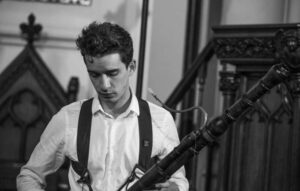
CLAY ZELLER-TOWNSON
Clay Zeller-Townson is the founder and Artistic Director of the baroque band Ruckus. He is based between Vermont and New York City. He plays with the leading period instrument ensembles in North America including: Tafelmusik, The Handel and Haydn Society, Philharmonia Baroque Orchestra, Boston Baroque and Trinity Baroque Orchestra. He has produced and premiered many new works for early instruments. He is a visiting instructor of Baroque Bassoon at New England Conservatory. He has given coachings on performance practice, masterclasses and lessons at UCLA, The Colburn School, The University of Missouri and The Eastman School of Music.
Clay was born in Nova Scotia, raised in eastern North Carolina, and found his way to the baroque bassoon by way of the tenor saxophone. He holds a Bachelor’s degree and Performer’s Certificate from The Eastman School of Music, a Master’s degree from The Juilliard School and the Advanced Certificate in Music Education from CUNY-Brooklyn College.
Passionate about rural arts education, Clay has taught K-8 general music in the Stamford and Readsboro, Vermont public schools. From 2011-2016 he taught at The North Carolina Governor’s School as Instrumental Music Faculty.

COLEMAN ITZKOFF
Cellist and performer Coleman Itzkoff stands at the intersection of baroque/classical/new music, contemporary dance, and experimental theater. Whether premiering works by living composers and performing baroque music on historical instruments in the same concert, delivering enigmatic monologues in a piece of avant-garde dance theater, composing, arranging, and recording music for the Amazon film Le Bal des Folles, or simply playing solo Bach for hospital patients in the time of COVID, Coleman continues to push the boundaries of what it means to be a musician of the 21st century.
As a soloist, he has been featured soloist with many great orchestras, including recent appearances with the Houston, San Diego, and Cincinnati Symphonies. He is a dedicated member of the early music ensembles Ruckus and Twelfth Night, and is a founding member of AMOC. Coleman holds a Bachelors in Music from Rice University, a Masters in Music from USC, and an Artist Diploma from The Juilliard School.

DOUG BALLIETT
Doug Balliett is a composer, instrumentalist, and poet based in New York City. The New York Times described his compositions as “brainily bubble gum and lovable shaggy,” his poetry as “brilliant and witty,” and his bass playing as “elegant.” Doug is a professor of baroque bass and violone at The Juilliard School, and he leads the Theotokos ensemble every Sunday at St. Mary’s Church. He plays regularly with Les Arts Florissants, Jupiter Ensemble, ACRONYM, Ruckus, BEMF, Alarm Will Sound, and other ensembles. In 2021, five of his Ovid Cantatas were filmed for Qwest TV with William Christie, Lea Desandre, and Nick Scott.
For three years he and his twin brother hosted a weekly show dedicated to living composers on WQXR’s new music channel Q2. Upcoming performances of his work include Beast Fights at Tanglewood with the Boston Symphony bass section, and the annual New Year’s Eve performance of his opera Gawain and the Green Knight.
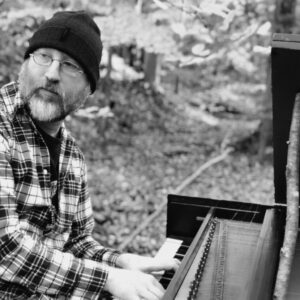
ELLIOT FIGG
Elliot Figg is a keyboardist, conductor and composer who lives in New York. He is a graduate of the Historical Performance Program at The Juilliard School where he studied harpsichord with Kenneth Weiss. He also studied with Arthur Haas at the Yale School of Music. Elliot is an active member of ACRONYM, Ruckus, and House of Time. Previous engagements include: Five Boroughs Music Festival, Through the Warping Lens, a concert featuring his own music; Conductor and harpsichordist for Haydn’s Jupiter’s Journey to Earth, Monteverdi’s Combattimento, Hasse’s Piramo e Tisbe, and St.-Georges’ L’Amant Anonyme, all with Little Opera Theatre of New York; Conductor and harpsichordist for Death of Classical’s productions of Dido and Aeneas and Hot Dogs, Hooch, & Handel in and around the catacombs of Green-Wood Cemetery; Deputy Music Director and harpsichordist for Farinelli and the King on Broadway.
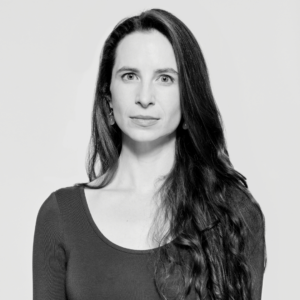
EMI FERGUSON
A 2023 recipient of the Avery Fisher Career Grant, Emi Ferguson can be heard live in concerts and festivals with groups including AMOC*, Ruckus, the Handel and Haydn Society, the New York New Music Ensemble, the Manhattan Chamber Players, and as the music director of Camerata Pacifica Baroque. Her recordings celebrate her fascination with reinvigorating music and instruments of the past for the present. Her debut album, Amour Cruel, an indie-pop song cycle inspired by the music of the 17th-century French court, was released by Arezzo Music in September 2017, spending four weeks on the classical, classical crossover, and world music Billboard charts. Her 2019 album Fly the Coop: Bach Sonatas and Preludes, a collaboration with continuo band Ruckus, debuted at #1 on the iTunes classical charts and #2 on the Billboard classical charts, and was called “blindingly impressive … a fizzing, daring display of personality and imagination” by The New York Times.
Emi has been a featured performer at the Marlboro, Lucerne, Ojai, Lake Champlain, Bach Virtuosi, and June in Buffalo festivals, often premiering new works by composers of our time. Emi was a featured performer alongside Yo-Yo Ma, Paul Simon, and James Taylor at the 10th Anniversary Memorial Ceremony of 9/11 at Ground Zero, where her performance of Amazing Grace was televised worldwide. Her performance that day is now part of the permanent collection at the 911 Museum. Emi has spoken and performed at several TEDx events and has been featured on media outlets including the Discovery Channel, Amazon Prime, WQXR, and Vox talking about how music relates to our world today. As a radio host and programmer, Emi first started working with New York’s WQXR as a member of their Artist Propulsion Lab where she developed the podcast series “This Composer Is Sick” with Max Fine, exploring the impact of Syphilis on composers Franz Schubert, Bedřich Smetana, and Scott Joplin. She one of four new hosts for WQXR’s Young Artists Showcase and the host of Once Upon A Composer, sharing musical stories with the youngest radio listeners. Her book Iconic Composers, co-written with Nicholas Csicsko alongside illustrations by David Lee Csicsko, introduces music lovers of all ages to 50 incredible Western Classical composers from the past 1000 years. Born in Japan and raised in London and Boston, she now resides in New York.
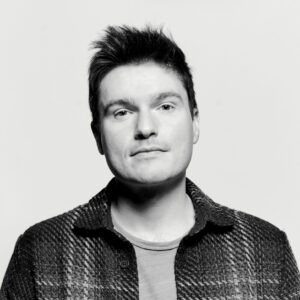
JONNY ALLEN
Jonny Allen is a Grammy-nominated percussionist whose contagious passion for music has been described as “a demonstration of raw power, virtuosity and feeling” by The New York Times. Jonny has won prizes at both the International Chamber Music Competition and the International Marimba Competition in Salzburg, giving respective performances at Carnegie Hall and Schloss Hoch in Flachau, Austria. He has also performed as a drum set soloist with Ghana’s National Symphony Orchestra at the National Theatre in Accra. Jonny performs regularly with his percussion quartet, Sandbox, and is a founding Core Member of the American Modern Opera Company (AMOC). He is also a committed educator on percussion faculty at the University of Missouri-Kansas City, The New School in Manhattan, and the Peabody Institute in Baltimore. Jonny holds a Bachelor’s degree and Performer’s Certificate from the Eastman School of Music, as well as a Masters degree and Artist Diploma from the Yale School of Music.
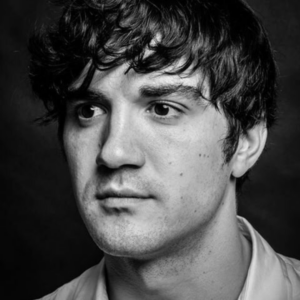
JORDAN DODSON
Jordon Dodson, described by Performance Today as “one of the top young guitarists of his generation,” is an in-demand musician and educator. An advocate of contemporary music, Dodson has given the premiere of hundreds of new works. In 2013 he was the first guitarist to graduate from the Curtis Institute of Music’s new guitar program. In the same year he won Astral Artists’ National Auditions and was selected to be Young Artist in Residence on American Public Media. He has appeared on several commercially available recordings including Jason Eckardt’s Subject and Elliot Cole’s Nightflower and Journals, vol. 1. Originally from Columbus, Ohio, Dodson is on faculty at EzraGuitar and The Smith School in New York City. He has given masterclasses and lectures internationally and holds degrees from the Curtis Institute of Music, the Manhattan School of Music, and the University of Cincinnati, and his teachers have included Clare Callahan, David Starobin, and Jason Vieaux. Jordan is endorsed by Oasis strings and plays a Gary Lee guitar.
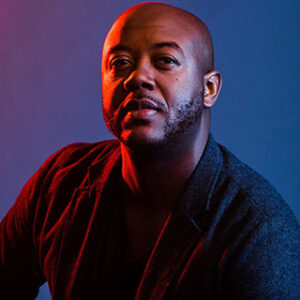
JORELL WILLIAMS
Baritone Jorell Williams, known for having “a solid vocal core and easy, natural production” (Opera News), and “a deliciously resonant baritone voice” (Broadway World) has been heralded as “a rock solid singer with a keen understanding of his own expressive depths” (The Washington Post), is gracing the world’s most prominent concert and opera stages. The 2024/25 season for Jorell Williams includes headlining Kentucky Opera’s seasonopening Fannie Lou Hamer Tribute Concert, followed by the New York Festival of Song (NYFOS) in “My Brother’s Keeper”. Jorell debuts with Manitoba Opera as Belcore in L’elisir d’amore, and stars in the title role of Le nozze di Figaro with Opera Columbus. Additional highlights include performances with the National Philharmonic in Handel’s Messiah, and the Omaha Symphony in Mendelssohn’s Elijah. Jorell also debuts with Montreal’s Choeur StLaurent in Walton’s Belshazzar’s Feast. Jorell is widely recognized for his concert work, having performed as a soloist in Bach’s Magnificat, Handel’s Messiah, Orff’s Carmina Burana, as well as Brahms’ Ein Deutsches Requiem, Vaughan Williams’ Dona Nobis Pacem, and Beethoven’s Ninth Symphony. Jorell has appeared with South Dakota Symphony, Greek National Opera, Orchestra of St. Luke’s, Jazz at Lincoln Center Orchestra, Amadeus Choir, Elmer Iseler Singers, and Juneau Symphony. Jorell has won awards from the Jensen Foundation, The Gerda Lissner International Competition, The Schuyler Foundation for Career Bridges, The Licia Albanese Puccini Foundation, The National Association of Negro Musicians, The Adams Art Song Competition and the Rochester Classical Idol XII Prize. He is an advocate for artist rights and serves as Chair of the Artistic Arts Council of Finger Lakes Opera, is a member of the Artistic Council for the Denyce Graves Foundation, OnSite Opera and is currently on the New Music board for the Brooklyn Art Song Society, using his experience to consult with arts organizations on their Diversity, Equity and Inclusion initiatives.

JULIA EICHTEN
Julia Eichten is a graduate of the Juilliard School, where they received the Hector Zaraspe Award in recognition of their choreography in 2011. Eichten was a founding member of L.A. Dance Project and is a current member of AMOC* (American Modern Opera Company). Julia moves between Opera, Theater and Dance as a Director, Choreographer, Educator and Performer. In 2024, Julia choreographed and had their debut performance with Long Beach Opera in, “ISOLA.” Curated an evening, “Art is Gay” with Eichterling (Bret Easterling & Eichten) alongside Anthony Roth Costanzo in NYC at Art Bath. They created a new work on Ballet Florida and performed in Carolyn Chen’s “How to Fall Apart,” at L.A. Dance Project with AMOC* presented by Monday Evening Concerts. “True Love Will Find You In The End” a film, directed by Bret Easterling, choreographed and starring by Easterling & Eichten was shown at Hauser & Wirth, NYC as a part of Screening Room: ‘Performance on Film’ Series. Most recently, Eichten performed in Joan Jonas’ iconic Mirror Piece I & II at The Getty Museum, which inspired hat company, PAY DANCERS. Most recently she had performances at CRAWLSPACE LA with partner, Juniper XR in their ongoing work, “Untitled Xirl,” and at MOCA Geffen with WILD UP as a part of their Democracy Series, in “The Democracy Bardo.”

KEIR GOGWILT
Keir GoGwilt is a violinist, composer, and musicologist who was born in Edinburgh and grew up in New York City. His work combines historical research and collaborative experimentation across a range of musical styles and genres. He has soloed with groups including the Orchestra of St. Luke’s, Philharmonia Baroque Orchestra, Chinese National Symphony, Orquesta Filarmonica de Santiago, and the Boston Modern Orchestra Project. This year he is creating and performing a new stage role for Marie & Pierre by Bobbi Jene Smith and Celeste Oram with the Basel Sinfonieorchester and Ballet, composing for the JACK Quartet as artist-in-residence, performing his speculative-historical project Zarabanda Variations with AMOC, and publishing an article for the Bach Journal.
GoGwilt earned his PhD in Music from UC San Diego in 2022 and was awarded the Chancellor’s Dissertation Medal. As an undergraduate at Harvard he studied Literature, and was awarded the Louis Sudler Prize in the Arts.

KYLE SCHEURICH
Kyle Scheurich was born in 1992 in New York. In 2010 he graduated from Fiorello H. LaGuardia High School for Music & Art and the Performing Arts. During his time at LaGuardia High School he also studied at Manhattan Youth Ballet under the direction of Francois Perron. He graduated from The Juilliard School under the direction of Larry Rhodes, and joined Batsheva – the young Ensemble in 2014. Kyle joined Batsheva Dance Company in 2016-2021, with Ohad Nahirin acting as both artistic director and house choreographer. Kyle has performed with AMOC (American Modern Opera Company) for the stage premiere of Bobbi Jene Smith’s & Or Schreiber’s ‘Broken Theatre’.
Currently Kyle performs in various works, under the direction of choreographer Marlene Monteiro Freitas, co-founder of P.OR.K (Portugal). Kyle is a teacher of Gaga movement language and works as a stager/rehearsal director for Ohad Nahirin at universities and dance companies around the world. Kyle is also an Ilan Lev Method practitioner & DJ.

MATTHEW AUCOIN
Matthew Aucoin is an American composer, conductor, and writer, and a 2018 MacArthur Fellow. He is a co-founder of the pathbreaking American Modern Opera Company (AMOC*), was the Los Angeles Opera’s Artist in Residence from 2016 to 2020, and currently serves as an Arnhold Creative Associate at The Juilliard School.
Aucoin’s orchestral and chamber music has been performed, commissioned, and recorded by such leading artists and ensembles as Yo-Yo Ma, the Philadelphia Orchestra, the Chicago Symphony, Zurich’s Tonhalle Orchestra, the BBC Scottish Symphony, the Los Angeles Chamber Orchestra, and the Brentano Quartet. In the summer of 2023, the MET Orchestra, conducted by Yannick Nézet-Séguin, featured Aucoin’s orchestral work “Heath” on its first European tour in several decades.
Aucoin is also well-known for his operas, which include Eurydice, Crossing, and Second Nature. These works have been produced at the Metropolitan Opera, the Los Angeles Opera, Brooklyn Academy of Music (BAM), Boston Lyric Opera, the Lyric Opera of Chicago, and the Canadian Opera Company, among others. The Metropolitan Opera’s recording of Eurydice was nominated for a Grammy in 2023.
Aucoin’s other recent conducting engagements include appearances with the Los Angeles Opera, Santa Fe Opera, Houston Grand Opera, Boston Lyric Opera, San Diego Symphony, Salzburg’s Mozarteum Orchestra, Ojai Music Festival, Philharmonia Baroque Orchestra, Rome Opera Orchestra, and many other ensembles. Aucoin’s book about opera, The Impossible Art: Adventures in Opera, was published in 2021 by Farrar, Straus, & Giroux. He has taught at Harvard University, and his essays regularly appear in leading publications such as The New York Review of Books and The Atlantic.

PAUL APPLEBY
Admired for his interpretive depth, vocal strength, and range of expressivity, tenor Paul Appleby is one of the most sought-after voices of his generation. He graces the stages of the world’s most distinguished concert halls and opera houses and collaborates with leading orchestras, instrumentalists, and conductors. Opera Newswrites, “[Paul’s] tenor is limpid and focused, but with a range of color unusual in an instrument so essentially lyric… His singing is scrupulous and musical; the voice moves fluidly and accurately.”
Appleby’s concert calendar for the 2024–25 season includes the title role of Berlioz’ La damnation de Faust with Hannu Lintu leading the Gulbenkian Orchestra and Choir, Haydn’s The Creation with Martin Pearlman and Boston Baroque, concert performances of Puccini’s La Rondine with Sir Antonio Pappano and the London Symphony Orchestra, John Corigliano’s captivating Poem in October, inspired by a rich and imaginative poem by Dylan Thomas, with the Chamber Music Society of Lincoln Center, and Evangelist in Bach’s Matthäus-Passion with Kent Tritle at the Cathedral of St. John the Divine. The tenor returns to the stage of the Metropolitan Opera for the company premiere of John Adams’ Antony and Cleopatra, reprising the role of Caesar which was written for him, in a staging by groundbreaking director Elkhanah Pulitzer.
Respected as a consummate recital artist, Appleby has presented solo appearances at the Wigmore Hall with Malcolm Martineau, toured North America extensively with pianists Natalia Katyukova, Ken Noda, and Conor Hanick, and has given his Tanglewood debut in a performance of Janáček’s The Diary of One Who Vanished with Emanuel Ax. With pianist Wu Han, he has sung Schubert’s masterpiece, Winterreise, under the auspices of The Schubert Club. Paul Appleby’s recording catalogue includes Nico Muhly’s opera Two Boys, recorded live by the Metropolitan Opera and released by Nonesuch; DVDs of Glyndebourne’s acclaimed presentation of Handel’s Saul and Berlioz’s Béatrice et Bénédict released commercially by Opus Arte; Dear Theo, the first album dedicated solely to works by American composer Ben Moore released by Delos; and Songs and Structures, a portrait album of recent vocal and chamber works by composer Harold Meltzer released on Bridge Records, in addition to other recordings by Virgin Classics, and EMI’s Juilliard Sessions. Appleby is a founding core member of the American Modern Opera Company (AMOC*).
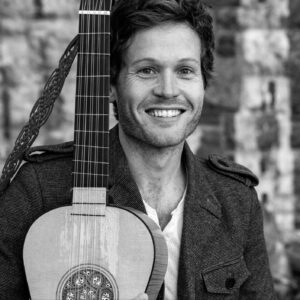
PAUL HOLMES MORTON
Paul Holmes Morton is native to the state of Pennsylvania, where he had his first music lessons on his father’s banjo. His studies with the virtuoso classical guitarist Ernesto Tamayo gifted him a technical tour through musical theories and history. Later Morton picked up the lute, and found it lying at the crossroads between the classics and the living folk traditions. His explorations of performance practice carry him to Handel operas, old time tunes, new compositions, and all there is between.
Perpetually inspired by music as a vehicle to transport oneself across time and culture, Paul Holmes can be found in a variety of venues from cathedrals and concert halls to smoky bars and country barns, anywhere that allows performance to lend harmony to the present noise.
As a lutenist, guitarist, banjo player, composer, and arranger Morton performs across North America and beyond with Ruckus, The Chivalrous Crickets, and the Baroque Chamber Orchestra of Colorado. An active recording artist, his musicianship can be found on albums by The Chivalrous Crickets, Makaris, Emi Ferguson, Tiny Glass Tavern, and Paul Simon.
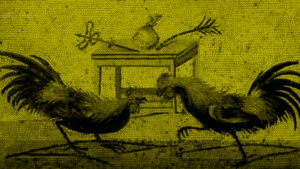
YOUNG PEOPLE’S CHORUS OF NEW YORK CITY
YPC is an internationally acclaimed choral ensemble, praised for its virtuosity and brilliant sound by The New York Times. Under the leadership of Founder and Artistic Director Francisco J. Núñez, a MacArthur Fellow, and Creative Director Elizabeth Núñez, the non – profit organization uplifts over 2,000 young people annually, representing every neighborhood of New York City, empowering children of all backgrounds with a unique program of music education and choral performance that unlocks pathways to success through the arts.
Renowned for its expansive repertoire, YPC (Young People’s Chorus of New York City) has commissioned hundreds of works from emerging and established composers. Their exceptional performances have been heard in five continents, where they performed with leading orchestras at world famous venues like Tokyo’s Bunkyo Civic Hall, Czech Republic’s Smetana Hall, Beijing’s Opera House, and New York City’s Lincoln Center and Carnegie Hall. YPC regularly performs on national radio and television programs including CBS Sunday Morning and has been featured on NBC, ABC, BBC, CCTV, FOX, NHK, PBS, and more..
Among YPC’s many honors are a National Arts and Humanities Youth Program Award from the White House, an honor from First Lady Laura Bush, and performances before prime ministers, Pope Francis and Pope John Paul.
YPC has competed in international competitions and most recently won 10 gold medals and four world championships during the World Choir Games in Korea 2023 and New Zealand 2024. Their holiday film special Topsy Turvy New York won a 66th Annual New York Emmy® Award. Its documentary This Time Round, earned “Best Producer” at the Toronto Indie Filmmakers Festival and “Best Soundtrack” at the New York International Film Awards.
Reference Guide
A novelist, short-story writer, poet, essayist, and diplomat who was probably the most important Mexican woman writer of the 20th century. She was deeply compelled by the writings of Spanish 16th Century religious activist and author Saint Teresa of Avila and Sor Juana Ines de la Cruz. Learn more.
Written in 1950, this was an early collection of poems by Castellanos
A 2nd Century apocryphal text not appearing in the King James Bible or modern Reina Valera Bible, the Protevangelical Gospel of St. James tells the story of the birth, childhood, and early adolescence of Mary, mother of Jesus. The text featured in El Niño is drawn from Chapter 17. Read the full text here.
The primary English translation of the Old and New Testaments in current use. It was made in 1604—by a commission brought together by King James—in response to issues with earlier English language translations developed in the prior century.
Initially translated by former Catholic Monk Casiodoro de Reina in 1569 and revised by his student Cipriano de Valera in 1602, the Reina Valera Bible is the common Spanish-language translation of the bible used by Spanish-speaking protestants.
Living in Mexico in the 17th century, Sor Juana was a poet, dramatist, scholar, and nun, an outstanding writer of the Latin American colonial period and of the Hispanic Baroque. Learn more.
The Nicaraguan poet— who lived from 1867-1916 —is credited with initiating the Spanish-language literary movement of “modernismo” in the late 19th century. Learn more.
On October 2, 1968 in the Tlatelolco section of Mexico City, the Mexican Armed Forces opened fire on a group of unarmed civilians in the Plaza de las Tres Culturas who were protesting the upcoming 1968 Summer Olympics. 300 people —most of them students—were killed. Learn more.
Aztec goddess who represented sexual impurity and sinful behavior. Learn more.
The Gospel of Pseudo-Matthew (Ps. -Mt.) is one of the most important witnesses in the Latin West to apocryphal stories about the lives of Mary, Joseph, Jesus, and Mary’s parents, Anna and Joachim. Learn more.
A collection of Rosario Castellanos poems, El rescate del mundo (The Ransom of the World), was published in 1952; these are short, spare poems that provide rare descriptive tributes to indigenous women and their work. Learn More.
“…elevated an already-revisionist work into something much more powerful”
The New York Times
Upcoming tour performances:
December 21, 2023 at Cathedral of St. John the Divine, New York, NY. Learn More
